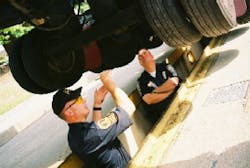“A significant problem we are noticing in recent years is the practice of manually adjusting self-adjusting brake adjusters. If you have a brake that is over-stroking and it has a self-adjusting or automatic brake adjuster, you more than likely have a problem with the brake or the adjuster. If you readjust it, you aren‘t fixing the underlying problem.” -Stephen F. Campbell, executive director, Commercial Vehicle Safety Alliance (CVSA)
Despite all the advances in safety technologies discussed in my last post, when you really get down to it, there‘s really but one - and some would say only one - absolutely critical safety system on today‘s commercial truck: the brakes. Without properly functioning brakes, every other safety device on the vehicle - collision-warning radar, anti-rollover devices, etc. - is pretty much rendered moot. (Except for the seat belt - if your brakes fail, you better be wearing it!)
Back in May this year, the Commercial Vehicle Safety Alliance (CVSA) helped sponsor the “Operation Air Brake” campaign with local and federal-level law enforcement officials across 45 states and provinces across the U.S. and Canada during a 12-hour surprise inspection blitz. Some 11,908 vehicles were inspected, along with 93,751 brakes, and the results point to the industry‘s need to refocus its attention on basic brake maintenance, I think
Here‘s the tally of the Operation Air brake‘s findings:
9.9% of vehicles placed out of service for brake adjustment defects
8.3% of vehicles placed out of service for brake component defects
15.8% of vehicles placed out of service for brake related defects
9.4% of brakes with manual brake adjusters placed out of service
3.8% of brakes with self-adjusting brake adjusters placed out of service
4.7% of all brakes inspected placed out of service for brake adjustment defects
“Poorly adjusted or defective air brakes reduce the braking capacity of large vehicles and further increase their stopping distance,” said Stephen Campbell, CVSA‘s executive director. “Even under ideal conditions, the stopping distance of commercial vehicles can be twice as far as that of cars and other smaller vehicles. Having defective brakes increases the risk to the driver and any passenger, as well as to others traveling the roads.”
In a recent issue of the Technology and Maintenance Council‘s Fleet Adviser Newsletter, Kevin Kuhn, fleet shop maintenance manager for the TravelCenters of America noted that “manually adjusting auto slack adjusters can give operators a false sense of security about the effectiveness of the brakes. Adjusted auto-slacks will likely go out of adjustment again soon after their adjustment and manually adjusting auto slacks does not fix the underlying issue with the braking system.”
Brakes are the basic foundation block for commercial vehicle safety systems of all types, so if they don‘t work properly, the safety of the whole vehicle is compromised - not to mention those traveling alongside it. It just goes to show that, just as in sports, you‘ve got to keep focused on the fundamentals in order to sustain a high level of successful performance.
And on another note, from the “do as I say, not as I do” file ...
I just wanted to draw some attention to AB 2800, a section of Proposition 103 heading for California‘s statewide ballot. A group called Consumer Watchdog is all in a lather over this piece of legislation as it would allow insurance companies to put black boxes in the cars to monitor speed, mileage, etc., and thus charge certain drivers higher premiums based on their driving habits.
“The insurance industry would pick driver‘s pockets and peer into their cars with this bill, headed to the Senate Insurance committee this week," said Carmen Balber of Consumer Watchdog. “It would allow insurance companies to require drivers to install ‘spyware‘ in their cars that tracks speed, acceleration, location, time of day, mileage and other data. Under the legislation, consumers who refuse to give up their privacy would pay higher rates.”
Sponsors say the bill would encourage motorists to drive less by lowering insurance rates for lower mileage and it would also give discounts to drivers who put black box technology in their cars. “Insurers want to know where we drive, when we drive and how long it takes us to get there, but they shouldn‘t get to charge more to Californians who won't accept their spying,” said Balber. “AB 2800 just lets insurance companies charge drivers more for refusing to let them pry in their cars.”
Oh, I get it: black boxes are OK for commercial trucks, but not consumers. It‘s OK to monitor the performance of commercial truck drivers, but not the average motorist - that‘s “spying.” I think ALL vehicles, tractor-trailers down to cars, should have black boxes - then we all get measured to the same highway safety standards. This legislative effort will show us if the motoring public is willing to be subject to the same black boxes they want for truckers ... or if it‘s a case of “do as I say, not as I do” all over again.
